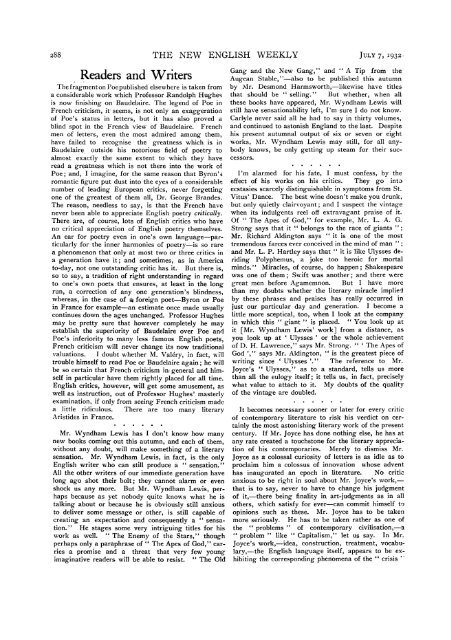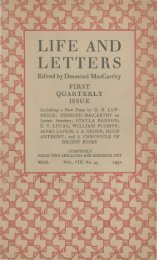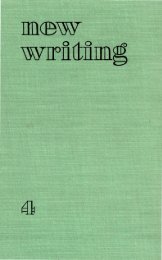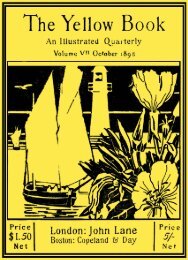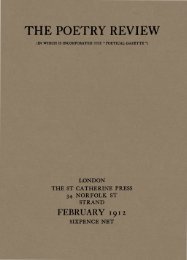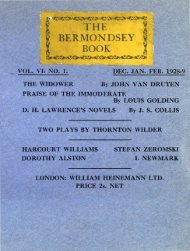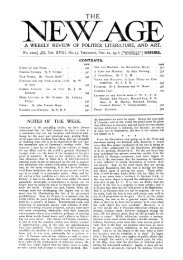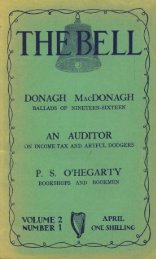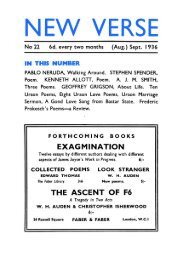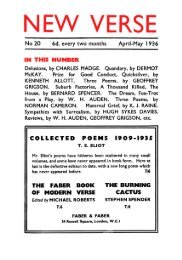Vol. I No. 12 - Modernist Magazines Project
Vol. I No. 12 - Modernist Magazines Project
Vol. I No. 12 - Modernist Magazines Project
You also want an ePaper? Increase the reach of your titles
YUMPU automatically turns print PDFs into web optimized ePapers that Google loves.
288. THE NEW ENGLISH WEEKLY JULY 7,1932-<br />
Readers and Writers<br />
The fragment on Poe published elsewhere is taken from<br />
a considerable work which Professor Randolph Hughes<br />
is now finishing on Baudelaire. The legend of Poe in<br />
French criticism, it seems, is not only an exaggeration<br />
of Poe's status in letters, but it has also proved a<br />
blind spot in the French view of Baudelaire. French<br />
men of letters, even the most admired among them,<br />
have failed to recognise the greatness which is in<br />
Baudelaire outside his notorious field of poetry to<br />
almost exactly the same extent to which they have<br />
read a greatness which is not there into the work of<br />
Poe; and, I imagine, for the same reason that Byron's<br />
romantic figure put dust into the eyes of a considerable<br />
number of leading European critics, never forgetting<br />
one of the greatest of them all, Dr. George Brandes.<br />
The reason, needless to say, is that the French have<br />
never been able to appreciate English poetry critically.<br />
There are, of course, lots of English critics who have<br />
no critical appreciation of English poetry themselves.<br />
An ear for poetry even in one's own language—particularly<br />
for the inner harmonies of poetry—is so rare<br />
a phenomenon that only at most two or three critics in<br />
a generation have it; and sometimes, as in America<br />
to-day, not one outstanding critic has it. But there is,<br />
so to say, a tradition of right understanding in regard<br />
to one's own poets that ensures, at least in the long<br />
run, a correction of any one generation's blindness,<br />
whereas, in the case of aj foreign poet—Byron or Poe<br />
in France for example—an estimate once made usually<br />
continues down the ages unchanged. Professor Hughes<br />
may be pretty sure that however completely he may<br />
establish the superiority of Baudelaire over Poe and<br />
Poe's inferiority to many less famous English poets,<br />
French criticism will never change its now traditional<br />
valuations. I doubt whether M. Valery, in fact, will<br />
trouble himself to read Poe or Baudelaire again; he will<br />
be so certain that French criticism in. general and himself<br />
in particular have them rightly placed for all time.<br />
English critics, however, will get some amusement, as<br />
well as instruction, out of Professor Hughes' masterly<br />
examination, if only from seeing French criticism made<br />
a little ridiculous.<br />
Aristides in France.<br />
There are too many literary<br />
Mr. Wyndham Lewis has I don't know how many<br />
new books coming out this autumn, and each of them,<br />
without any doubt, will make something of a literary<br />
sensation. Mr. Wyndham Lewis, in fact, is the only<br />
English writer who can still produce a " sensation."<br />
All the other writers of our immediate generation have<br />
long ago shot their bolt; they cannot alarm or even<br />
shock us any more. But Mr. Wyndham Lewis, perhaps<br />
because as yet nobody quite knows what he is<br />
talking about or because he is obviously still anxious<br />
to deliver some message or other, is still capable of<br />
creating an expectation and consequently a " sensation."<br />
He stages some very intriguing titles for his<br />
work as well. " The Enemy of the Stars," though<br />
perhaps only a paraphrase of " The Apes of God," carries<br />
a promise and a threat that very few young<br />
imaginative readers will be able to resist. " The Old<br />
Gang and the New Gang," and " A Tip from the<br />
Augean Stable,"—also to be published this autumn<br />
by Mr. Desmond Harmsworth,—likewise have titles<br />
that should be " selling." But whether, when all<br />
these books have appeared, Mr. Wyndham Lewis will<br />
still have sensationability left, I'm sure I do not know.<br />
Carlyle never said all he had to say in thirty volumes,<br />
and continued to astonish England to the last. Despite<br />
his present autumnal output of six or seven or eight<br />
works, Mr. Wyndham Lewis may still, for all anybody<br />
knows, be only getting up steam for their successors.<br />
I'm alarmed for his fate, I must confess, by the<br />
effect of his works on his critics. They go into<br />
ecstasies scarcely distinguishable in symptoms from St.<br />
Vitus' Dance. The best wine doesn't make you drunk,<br />
but only quietly clairvoyant; and I suspect the vintage<br />
when its indulgents reel off extravagant praise of it.<br />
Of " The Apes of God," for example, Mr. L. A. G.<br />
Strong says that it " belongs to the race of giants " ;<br />
Mr. Richard Aldington says " it is one of the most<br />
tremendous farces ever conceived in the mind of man '';<br />
and Mr. L. P. Hartley says that " it is like Ulysses deriding<br />
Polyphemus, a joke too heroic for mortal<br />
minds." Miracles, of course, do happen; Shakespeare<br />
was one of them; Swift was another; and there w ere<br />
great men before Agamemnon. But I have more<br />
than my doubts whether the literary miracle implied<br />
by these phrases and praises has really occurred in<br />
just our particular day and generation. I become a<br />
little more sceptical, too, when I look at the company<br />
in which this " giant " is placed. " You look up at<br />
it [Mr. Wyndham Lewis' work] from a distance, as<br />
you look up at * Ulysses ' or the whole achievement<br />
of D. H. Lawrence," says Mr. Strong. " * The Apes of<br />
God '," says Mr. Aldington, " is the greatest piece of<br />
writing since 4 Ulysses '." The reference to Mr.<br />
Joyce's " Ulysses," as to a standard, tells us more<br />
than all the eulogy itself; it tells us, in fact, precisely<br />
what value to attach to it. My doubts of the quality<br />
of the vintage are doubled.<br />
It becomes necessary sooner or later for every critic<br />
of contemporary literature to risk his verdict on certainly<br />
the most astonishing literary work of the present<br />
century. If Mr. Joyce has done nothing else, he has at<br />
any rate created a touchstone for the literary apprecia<br />
tion of his contemporaries. Merely to dismiss Mr.<br />
Joyce as a colossal curiosity of letters is as idle as to<br />
proclaim him a colossus of innovation torhose advent<br />
has inaugurated an epoch in literature. <strong>No</strong> critic<br />
anxious to be right in soul about Mr. Joyce's work,—<br />
that is to say, never to have to change his judgment<br />
of it,—there being finality in art-judgments as in all<br />
others, which satisfy for ever—can commit himself to<br />
opinions such as these. Mr. Joyce has to be taken<br />
more seriously. He has to be taken rather as one of<br />
the " problems " of contemporary civilisation,—a<br />
11 problem " like " Capitalism," let us say. In Mr.<br />
Joyce's work,—idea, construction, treatment, vocabulary,—the<br />
English language itself, appears to be exhibiting<br />
the corresponding phenomena of the " crisis "


